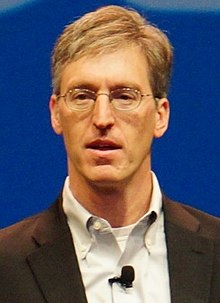This article may rely excessively on sources too closely associated with the subject, potentially preventing the article from being verifiable and neutral. (June 2023) |
Steven Levitt | |
|---|---|
 Levitt in 2012 | |
| Born | May 29, 1967 Boston, Massachusetts, U.S. |
| Nationality | American |
| Education | Harvard University (BA) Massachusetts Institute of Technology (PhD) |
| Children | 7 |
| Academic career | |
| Field | Social economics Applied Microeconomics |
| Institution | University of Chicago |
| School or tradition | Chicago School of Economics |
| Doctoral advisor | James M. Poterba[1] |
| Doctoral students | Brian Jacob |
| Influences | Gary Becker Kevin Murphy Josh Angrist |
| Contributions | Freakonomics, SuperFreakonomics |
| Awards | John Bates Clark Medal (2003) |
| Information at IDEAS / RePEc | |
Steven David Levitt (born May 29, 1967) is an American economist and co-author of the best-selling book Freakonomics and its sequels (along with Stephen J. Dubner). Levitt was the winner of the 2003 John Bates Clark Medal for his work in the field of crime, and is currently the William B. Ogden Distinguished Service Professor of Economics at the University of Chicago as well as the Faculty Director and Co-Founder of the Center for Radical Innovation for Social Change at the University of Chicago[2] which incubates the Data Science for Everyone coalition.[3] He was co-editor of the Journal of Political Economy published by the University of Chicago Press until December 2007. In 2009, Levitt co-founded TGG Group, a business and philanthropy consulting company.[4] He was chosen as one of Time magazine's "100 People Who Shape Our World" in 2006.[5] A 2011 survey of economics professors named Levitt their fourth favorite living economist under the age of 60, after Paul Krugman, Greg Mankiw and Daron Acemoglu.[6]
- ^ Four essays in positive political economy
- ^ "Bringing math class into the data age". 28 February 2020.
- ^ "Data Science for Everyone". Data Science for Everyone. Retrieved 2021-09-28.
- ^ TGG Group profile[permanent dead link]
- ^ Pollack, Kenneth M. (8 May 2006). "The 2006 Time 100". Time. Retrieved 5 December 2016.[permanent dead link]
- ^ https://econjwatch.org/file_download/487/DavisMay2011.pdf [bare URL PDF]